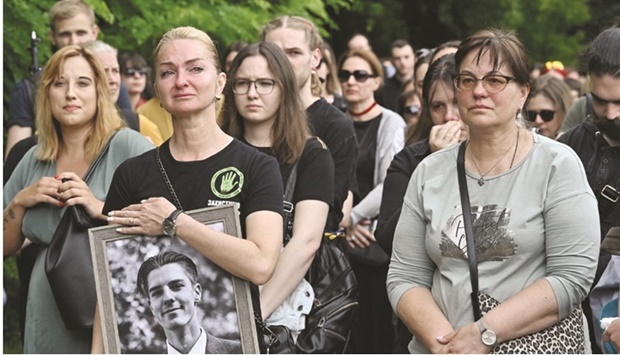The war in Ukraine could last for years, the head of Nato said yesterday, calling for steadfast support from Ukraine’s allies as Russian forces battle for territory in the country’s east.
Secretary-General Jens Stoltenberg said supplying state-of-the-art weaponry to Ukrainian troops would boost the chance of freeing its eastern region of Donbas from Russian control, Germany’s Bild am Sonntag newspaper reported.
After failing to take the capital Kyiv early on in the war, Russian forces have focused efforts on trying to take complete control of the Donbas, parts of which were already held by Russian-backed separatists before the February 24 invasion.
“We must prepare for the fact that it could take years. We must not let up in supporting Ukraine,” Stoltenberg was quoted as saying.
“Even if the costs are high, not only for military support, also because of rising energy and food prices.”
A top target in Moscow’s offensive to seize full control of Luhansk region — one of the two provinces making up the Donbas — is the industrial city of Sievierodonetsk.
Russia said yesterday its offensive in the city was proceeding successfully.
Luhansk Governor Serhiy Gaidai told Ukrainian TV that fighting made evacuations from the city impossible, but that “all Russian claims that they control the town are a lie. They control the main part of the town, but not the whole town.”
Russia’s defence ministry said it had taken control of Metyolkine, just southeast of Sievierodonetsk, with Russian state news agency TASS reporting that many Ukrainian fighters had surrendered there. Ukraine’s military said Russia had “partial success” in the area.
Analysts at the Institute for the Study of War, a Washington-based think tank, wrote in a note that “Russian forces will likely be able to seize Sievierodonetsk in the coming weeks, but at the cost of concentrating most of their available forces in this small area”.
In Sievierodonetsk’s twin city of Lysychansk, residential buildings and private houses had been destroyed, Gaidai said. “People are dying on the streets and in bomb shelters,” he added. He later said 19 people had been evacuated yesterday.
In Ukraine’s second largest city Kharkiv, northwest of Luhansk, Russia’s defence ministry said its Iskander missiles had destroyed weaponry recently supplied by Western countries.
Russian forces were trying to approach Kharkiv, which experienced intense shelling earlier in the war, and turn it into a “frontline city”, a Ukrainian interior ministry official said.
Kharkiv’s mayor, Ihor Terekhov, said he would cancel a planned trip to Madrid to discuss the city’s reconstruction with Norman Foster and other architects due to the uncertainty caused by increased bombardment.
In southern Ukraine, Western weaponry had helped Ukrainian forces advance 10km towards Russian-occupied Melitopol, its mayor said in a video posted on Telegram from outside the city.
Ukrainian President Volodymyr Zelensky, who has rallied citizens with daily filmed messages, said he had visited forces in the southern Mykolaiv region, about 550km south of Kyiv.
“Their mood is assured: they all do not doubt our victory,” he said in a video yesterday that appeared to have been recorded on a moving train. “We will not give the south to anyone, and all that is ours we will take back.”
In Mykolaiv and Odesa regions, Zelensky said he had heard reports on destruction from Russian strikes.
“The losses are significant. Many houses have been destroyed; civilian logistics have been disrupted,” he said.
Mourners attend the funeral ceremony for killed Ukrainian serviceman
Roman Ratushny (portrait) at a cemetery in Kyiv. Ratushny was a leading figure of Ukraine’s pro-European Maidan movement, an anti-corruption activist, and fought Russian forces with the Ukrainian army. Ratushny died on June 9 near Izium, in the Kharkiv region, where Ukrainian forces are confronting the Russian army, at the age of 24. (AFP)

Ukraine
